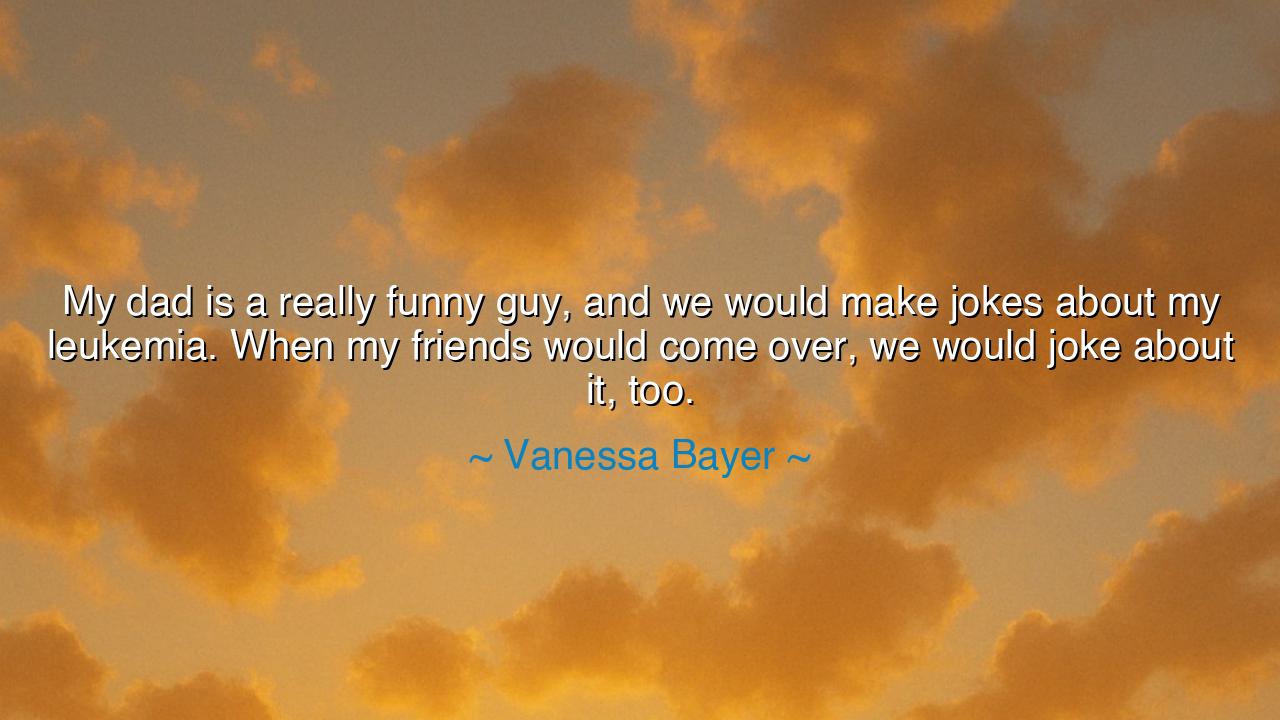
My dad is a really funny guy, and we would make jokes about my
My dad is a really funny guy, and we would make jokes about my leukemia. When my friends would come over, we would joke about it, too.






The words, “My dad is a really funny guy, and we would make jokes about my leukemia. When my friends would come over, we would joke about it, too,” come from Vanessa Bayer, the American actress and comedian known for her radiant humor and her time on Saturday Night Live. But beneath this seemingly lighthearted confession lies a deep well of wisdom, courage, and humanity. For laughter, in this context, is not escape—it is defiance. It is the ancient weapon of the soul against despair. Bayer’s words remind us that even in the face of illness and fear, the spirit can still choose to shine rather than shatter.
In the style of the ancients, we may say that she speaks not merely of humor, but of resilience made radiant. The disease, leukemia, threatened her body; yet she and her father refused to let it conquer their joy. They transformed suffering into story, and story into laughter. For humor is the alchemy of pain—it turns fear into familiarity and weakness into power. When Bayer and her family laughed at the very thing that sought to destroy her, they took from it its sting. This is the essence of the warrior’s heart: to turn one’s wounds into weapons of light.
The ancients knew this truth well. The Stoic philosophers taught that while fate may break the body, it cannot break the will. Likewise, the humorist stands among the bravest of souls, for they look upon sorrow not with bitterness, but with wit. Consider Winston Churchill, who during the darkest days of war, laced his speeches with laughter. When the bombs fell over London, he quipped that the citizens should take comfort—at least Hitler seemed to have a keen interest in their architecture. The laughter that followed was not denial, but defiance—a collective reminder that the spirit of a people cannot be conquered by terror. So too did Vanessa Bayer and her father wield laughter as a shield, not to hide from suffering, but to rise above it.
Her words reveal another truth: that humor binds hearts. By joking about her illness with her father and her friends, Bayer made space for others to join her in courage. In doing so, she transformed isolation into community. When suffering is named and laughed at, it loses its tyranny. It becomes something shared, something less monstrous. To laugh together in pain is to whisper to the darkness: You cannot have all of me. The friends who joined her laughter were not mocking her struggle; they were helping her reclaim control over her story.
There is a paradox here—the same one the ancients saw in the laughter of warriors and philosophers alike. True strength often wears the mask of humor. For what is laughter if not a refusal to surrender to fear? When the body trembles, the mind can still laugh—and in that laughter lies victory. Vanessa Bayer’s father, with his jokes, taught her the oldest kind of love: the love that does not seek to protect by shielding, but by empowering. Their shared humor was a ritual of survival, a declaration that illness could touch the flesh but never the spirit.
And so, from her story, a great lesson emerges: laughter is not the absence of pain—it is the transcendence of it. In times of sorrow, do not silence your joy out of reverence for your suffering. Let your laughter ring out like a hymn of endurance. It does not mean you do not hurt—it means you still believe in life. Those who can smile through tears do not deny reality; they redefine it. They remind the world that hope, too, can be loud.
Therefore, my child, when hardship comes—and it will—remember this: you may not choose your trials, but you may always choose your response. Find your humor as Vanessa Bayer found hers; find those who will laugh beside you as her father did. For in laughter there is healing, and in shared joy there is salvation. Let your laughter be the song that illness, loss, or fear cannot silence. And when others face their own darkness, lend them your smile—not as dismissal, but as a beacon.
In the end, Vanessa Bayer’s quote is not about comedy—it is about courage disguised as laughter. It teaches that even when life seems cruel, the heart can remain kind, open, and light. The joke, then, is not on the sufferer—but on the sorrow itself. For laughter, when born of love and strength, is the soul’s way of saying: You may break my body, but you will never break my joy.






AAdministratorAdministrator
Welcome, honored guests. Please leave a comment, we will respond soon